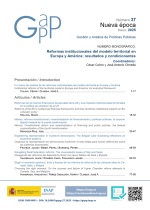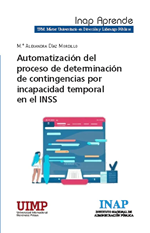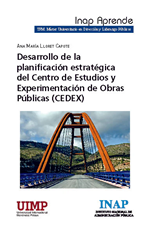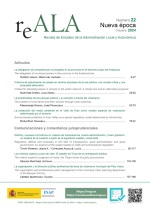Joel Mendoza-Ruiz
México: reforma constitucional y recentralización de financiamiento y políticas públicas, la corporatización federal de la cuarta trasformación
En este artículo, publicado en el número 37 de la revista Gestión y Análisis de Políticas Públicas (GAPP), se analiza la recentralización de la reforma constitucional del sexenio 2018-2024 en México, mediante la definición de los factores de éxito en la aprobación y de resultados en la implementación.

Joel Mendoza-Ruiz es Doctor en Ciencias Políticas y Sociales por la Universidad Nacional Autónoma de México
El artículo se publicó en el número 37 de la revista Gestión y Análisis de Políticas Públicas
Objetivos: analizar la recentralización de la reforma constitucional del sexenio 2018-2024, mediante la definición de los factores de éxito en la aprobación y de resultados en la implementación. Metodología: se utiliza la síntesis bibliográfica y hemerográfica en función de los tres elementos teóricos de la corporatización federal. Resultados: México, como caso más longevo de corporatización federal, llegó al radicalismo de los tres elementos aludidos. Primero, el discurso social de la hegemonía gobernante, más allá de la operación partidista, se ha convertido en presión social de las mayorías que lo reproducen, complementada con represión de las minorías disidentes. Segundo, la reglamentación de las relaciones intergubernamentales en función del proyecto de nación fue mínima, se regresó a la celebración de acuerdos intergubernamentales que concretan transferencias financieras dirigidas al bilateralismo adaptado. Tercero, la invasión ideológica y operativa de sectores estratégicos específicos obvió el desempeño federal, al establecerse relaciones directas del Ejecutivo nacional con sus clientelas políticas. Conclusiones: se señala la contradicción a la esencia misma de la cuarta trasformación, con tres niveles de fracaso: la reforma parcial (no estructural), la reforma inacabada (sin implementación) y la reforma que excluye en lugar de universalizar los subsidios.
MEXICO: CONSTITUTIONAL REFORM AND RECENTRALIZATION OF FINANCING AND PUBLIC POLICIES, THE FEDERAL CORPORATIZATION OF THE FOURTH TRANSFORMATION
Objectives: To analyze the recentralization of the constitutional reform of the 2018-2024 six-year term, by defining the success factors in the approval and the results in the implementation. Methodology: A bibliographic and hemerographic synthesis based on the three theoretical elements of federal corporatization. Results: It shows that Mexico, as the longest-standing case of federal corporatization, reached the radicalism of the three aforementioned elements. First, the social discourse of the ruling hegemony, beyond the partisan operation, has become social pressure from the majorities that reproduce it, complemented by repression of dissident minorities. Second, the regulation of intergovernmental relations based on the nation project was minimal, returning to the celebration of intergovernmental agreements that specify financial transfers directed to adapted bilateralism. Third, the ideological and operational invasion of specific strategic sectors bypassed federal performance, establishing direct relations between the National Executive and its political clienteles. Conclusions: The contradiction to the very essence of the fourth transformation is pointed out, with three levels of failure: partial reform (non-structural), unfinished reform (without implementation) and the reform that excludes rather than universalizes subsidies.
Comentarios
Noticia aún sin comentar.
Escribir un comentario
Para poder opinar es necesario el registro. Si ya es usuario registrado, escriba su nombre de usuario y contraseña:
Si desea registrase en la Administración al Día y poder escribir un comentario, puede hacerlo a través el siguiente enlace: Registrarme en La Administración al Día.
- El INAP no es responsable de los comentarios escritos por los usuarios.
- No está permitido verter comentarios contrarios a las leyes españolas o injuriantes.
- Reservado el derecho a eliminar los comentarios que consideremos fuera de tema.
Ãltimos estudios
México: reforma constitucional y recentralización de financiamiento y políticas públicas, la corporatización federal de la cuarta trasformación
Seguridad jurídica y otras olvidadas reglas de principio: a propósito de los plazos de las concesiones demaniales de puertos deportivos y sus prórrogas
Conexión al Diario
Ãgora
Publicaciones
Lo más leÃdo:
- Legislación: Subvención a Entidades Locales integradas en la Reserva Regional de Caza de Cameros-Demanda
- Legislación: Pensiones públicas y revalorización de las pensiones del sistema de la Seguridad Social
- Legislación: Fomento de una alimentación saludable y sostenible en centros educativos
- INAP: Ya está disponible el boletín n.º 4 de la Comunidad de Formación de INAP Social
- INAP: Abierta la convocatoria del X Curso sobre el desarrollo de la Función Inspectora en la Administración General del Estado
- Actualidad: Todas las ofertas de empleo público, en el boletín semanal del Ministerio para la Transformación Digital y de la Función Pública
- Legislación: Medidas Administrativas y Tributarias
- Tribunal Supremo: Deniega el Tribunal Supremo a los traductores de lengua árabe que prestan servicios a la policía, el complemento singular de puesto A/idiomas del III Convenio Colectivo Único para el personal laboral de la Administración General del Estado
- Legislación: Metodología y condiciones de acceso y asignación de capacidad en el sistema de gas natural
- Legislación: Inclusión laboral de las personas pertenecientes a colectivos en riesgo o situación de exclusión social en empresas de inserción y en el mercado ordinario de trabajo


 Acceso gratuito
Acceso gratuito Acceso gratuito
Acceso gratuito Entrar
Entrar Entrar
Entrar





